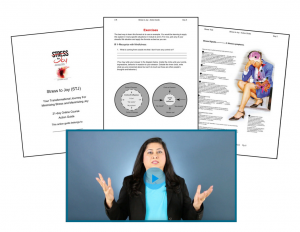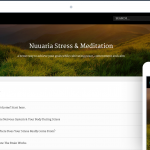Stress Management
“Stress, in addition to being itself, was also the cause of itself, and the result of itself.”
-British Medical Journal, 1951
Just as stress is different for each of us there is no stress reduction strategy that is a panacea. Jogging and other aerobic exercises, different types of meditation, prayer, yoga, and tai chi are great for many people but when arbitrarily imposed on others, they prove dull, boring and stressful. There is certainly no shortage of stress relievers and in addition to the above, various progressive muscular relaxation exercises, autogenic training, deep breathing, massage therapies, visual imagery, and self-hypnosis practices are popular. There are also acupuncture, acupressure, biofeedback, Alexander, Reiki, Feldenkrais and other bodywork and postural techniques. Some people find that listening to music, hobbies, volunteer work, keeping a daily journal of events and how they feel, laughter, playing with pets, taking short breaks or shopping helps them to relax. Others find relief for their stress-related symptoms from aromatherapy, nutritional supplements like chamomile, spearmint, kava kava, adaptogens, and St. John’s wort or even sitting under a pyramid. There are also prescription tranquilizers, sedatives, hypnotics, antidepressants and beta-blockers for specific complaints. In addition, a variety of cranioelectromagnetic stimulation devices have been found to be effective and safe for anxiety, insomnia, and drug-resistant depression. Strong emotional support from group therapy, family or friends is a powerful stress buster.
Most of the above are designed to reduce the annoying somatic and emotional effects of stress. The focus in recent years has been on preventing such problems, which makes more sense. This involves identifying the sources of stress in your life and finding ways to avoid them or reduce their impact. We sometimes create our own stress because of habits and traits that can have harmful effects that can be reduced using cognitive restructuring techniques such as behavioral modification, assertiveness training, time management, and stress inoculation. Others turn to smoking, alcohol or drugs to relieve their stress but these short-term solutions eventually cause even more stress. Long-term use of prescription medications can result in dependency or adverse side effects and some supplements can have similar problems or interact with other drugs. St. John’s wort has been shown to interfere with numerous medications and kava kava is banned in the UK because of liver damage.
 As indicated, the key to reducing stress is to prevent it. Getting enough sleep, a proper diet, avoiding excess caffeine and other stimulants and taking time out to relax may be helpful in this regard. Many stress relievers work because of the power of the placebo effect that comes from having faith in the procedure or the therapist. Other very different approaches can achieve the same results because they reduce feelings of helplessness and provide a sense of control over the problem.
As indicated, the key to reducing stress is to prevent it. Getting enough sleep, a proper diet, avoiding excess caffeine and other stimulants and taking time out to relax may be helpful in this regard. Many stress relievers work because of the power of the placebo effect that comes from having faith in the procedure or the therapist. Other very different approaches can achieve the same results because they reduce feelings of helplessness and provide a sense of control over the problem.
Stress is an unavoidable consequence of life. There are some stresses like the loss of a loved one that you can’t hope to avoid and others that you can prevent or influence. The trick is in learning how to distinguish between the two so that you’re not constantly frustrated like Don Quixote tilting at the windmill and devote your time and talent to areas where you can make a difference. Try to follow the advice in Reinhold Niebuhr’s, serenity prayer, “Grant me the courage to change the things I can change, the serenity to accept the things I can’t change, and the wisdom to know the difference.”
A Comprehensive Stress Management Program
There are numerous stress management training programs available, most of which focus on specific techniques, including meditation, yoga, progressive muscular relaxation, visual imagery aerobic exercises, listening to special music and various biofeedback devices. However, just as stress differs for each of us, no stress reduction strategy is a panacea. Any of the above approaches may be effective for some, but prove dull, boring and stressful when arbitrarily imposed on others. You have to find out what works for you and adhere to it because you enjoy it, rather than comply with something that you don’t look forward to. The best way to achieve this goal is to be made aware of what is available; bearing in mind that it is essential that this information comes from a reliable source.
Transforming Stress to Joy Online Course
 Decrease stress and boost your happiness, in just 15 – 20 minutes a day for 21 days with this American Institute of Stress certified comprehensive 21 modules online educational program in the practice of stress management.
Decrease stress and boost your happiness, in just 15 – 20 minutes a day for 21 days with this American Institute of Stress certified comprehensive 21 modules online educational program in the practice of stress management.
AIS has extensively evaluated several outstanding courses and found this to be one of the best comprehensive online educational programs at a great value for understanding and managing your stress. The Stress to Joy program was developed and is taught by bestselling author, Professor Rozina Lakhani, MD, MPH, FAIS, a board-certified psychiatrist with a masters degree in public health, who has extensive experience in teaching stress management.
This is a multimodality course using videos, audios and workbooks that takes you step-by-step on a journey of transformation, using real-world case studies and stories.
The Nuuaria Method®: An American Institute of Stress Certified Course in Meditation and More
 Thinking is the cause. Behavior is only the symptom. Behavior change, therefore, is only symptom treatment. We teach you how to think differently. This course consists of 6 Modules, 28 Lessons, 60+ Page Downloadable Workbook, and 6 one-to-one telephonic sessions with a Nuuaria mentor over three months.
Thinking is the cause. Behavior is only the symptom. Behavior change, therefore, is only symptom treatment. We teach you how to think differently. This course consists of 6 Modules, 28 Lessons, 60+ Page Downloadable Workbook, and 6 one-to-one telephonic sessions with a Nuuaria mentor over three months.

